PRSA should copy International Association of Business Communicators which has dropped its accreditation program, switched its printed magazine to online, and sees cultivating small PR firms as its future.
Russell Grossman, 2014 IABC chair, told the annual conference in Toronto June 10 that its mainstay corporate audience is drying up and it must cultivate small firms and individual practitioners serving small and medium-sized businesses—28 million in the U.S. and five million in the U.K.
IABC is more motivated than the PR Society to make changes since it lost $529K in 2013 and saw net assets plunge 56% to $680,013 from $1,209,086. A dispute with its web designer has resulted in $552,067 being listed as an “intangible asset” on its audit.
IABC’s recent dubious “claim to fame” is that it fired 16 of its 32 staffers on Nov. 30, 2012, breaking all known principles of internal communications. Staff head Christopher Sorek left the following June.
So we’re not holding up IABC as an example of good association management. Its financial reporting is the worst of any group we cover. Members get one report a year--in June at the annual conference, six months after the close of the year.
Again facing financial problems, it almost went under twice in its past. However, it is grappling with the changed PR/communications landscape which is more than we can say for the PR Society.
PRSA is Flat Earth Society/Twilight Zone
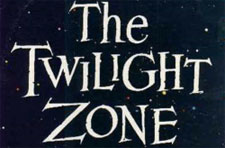 The Oct. 11 Assembly of the Society showed what a delusionary, out-of-touch with reality, politics-ridden group that it is.
The Oct. 11 Assembly of the Society showed what a delusionary, out-of-touch with reality, politics-ridden group that it is.
 Rockland |
Ketchum’s David Rockland took an outrageous half hour to tell delegates that new sources of members must be developed (a slide showed a dark cloud) and that younger members don’t accept the ban on non-APRs holding office. He had the nerve to say that the Society “has no competition,” specifically mentioning IABC.
IABC, about two-thirds the size of the Society, has its problems but at least it has conceded defeat in trying “accredit” its own members.
Its Accredited Business Communicator program was closed more than a year ago. It is now seeking International Standards Organization recognition of its new “certification” program, a process that could take years.
There will be two levels—generalist/specialist and strategic adviser. Recertification every few years will be required. The cost for members has not yet been set. The ABC credential, acquired by only 10% of members over the last 40+ years, had cost $500.
PR Society Ignores Own Research
What qualifies the Society for the Twilight Zone is that it probably paid upwards of $200k in 2013 for a study of APR in connection with the 50th anniversary this year. Professional fees ballooned $212,574 (70%) to $497,000 in the first nine months of 2013
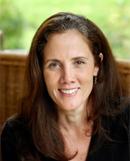 Freebairn-Smith |
Laura Freebairn-Smith of Hamden, Conn., who interviewed 750 members and conducted other research, told the 2013 Assembly that its APR program is invalid because it is self-administered and that “Employers are not using it as a hiring guide.”
She said the Universal Accreditation Board is dominated by the Society and not “independent.” She asked members numerous questions but was not allowed to ask the key one—whether the program should be closed.
Mickey Nall, 2013 chair, told Freebairn-Smith that “abandoning APR is not an option,” according to a posting by VP-P Stephanie Cegielski on the Society’s website.
Maintenance Weak, Ethics Not Addressed
Other Freebairn-Smith criticisms were that the “maintenance requirements are not stringent enough”; the UAB website is “dated and does not convey an image of a robust, successful credential,” and “concerns of ethical violations” are not addressed. “Monitoring and enforcement of ethical standards are weak,” said one of the slides she presented to the Assembly.
Although Freebairn-Smith’s office is only about 1.5 hours by train from ours, and we have research on APR dating back to 1968, she refused to visit us or even talk to us on the telephone. She told us not to email materials to her more than once a week.
Two items that were particularly germane to her research were Rene Henry’s 1999 study for the Fellows that found little interest in APR among 16 PR executive recruiters, and our compilation of APR costs showing the program lost $2.9 million from 1986-2002.
Speaker after Speaker Puffed APR
Finally allowed to cover the Assembly after being exiled for three years, we were shocked to hear speaker after speaker talk of APR in the most glowing terms, as though Freebairn-Smith had never made her study.
Typical was incoming chair Kathy Barbour saying, “I wear my APR pin proudly.” Chair Joe Cohen vowed numerous times to find new ways to improve and market APR.
Mark McClennan and Blake Lewis, competing for 2015 chair-elect, stressed their deep commitment to the APR process.
We could see no difference between the two candidates, who described their backgrounds in detail and stressed their ability to be “collaborative.” McClennan had the nerve to talk about the Society adding one percent to its "reserves" which were said to equal 42% of annual expenses. He quickly corrected himself to say that corporations have a "net asset balance" rather than a reserves. The actual net asset balance of the Society, if half of the $5 million in dues were deferred like IABC and virtually every other organization does, is about 10% of annual expenses.
We conclude that it was a phony election just to give the Assembly something to do since forcing the 250 delegates to spend two extra nights in D.C. hotels just to pass a motion opening to two board seats to non-APRs was such a waste of time and money.
IABC has its general meeting at 5 p.m. on the Monday of its conference which is another thing that the Society should copy.
The Society did not record the Assembly and we were threatened in writing with lifetime expulsion if we recorded any portion of it. IABC's annual meeting is live telecast, recorded and available for replay by anyone.
The Assembly was told that the Society had a signed contract with a new CEO but was waiting for permission from the previous employer before revealing who it was. We doubt that the AMSP/NAPL/NAQP, the combination of three printing/mailing groups that employ Joseph Truncale, would have blocked announcement of his new post (as of Jan. 12, 2015) at the Society. He should have been introduced to the Assembly and to the entire meeting.
Attendees Cold, Aloof
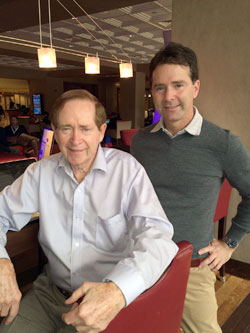 Jack, John O'Dwyer |
A work station for us was set up in the lobby of the Marriott Wardman Park hotel by the hotel itself but fewer than ten attendees ever visited us. Most just walked by with their noses in the air which is what they also did to us and son John when we sat in the last row of the Assembly from 8:30 a.m. to 4 p.m. on Oct. 11.
Similar treatment was given us at the opening night reception where we only talked to people we already knew. Walking around with a drink in one hand and a plate of food in another, looking for a scarce seat, we saw three empty places at one table. We asked the occupants if we could sit down and one said, “No.”
Although speakers at the Assembly vowed to do everything possible to make minorities welcome at the Society, one delegate saying that “white women are the new white men,” we saw a black woman at the opening night reception walking by herself.
We followed her as she circled the entire room without catching anyone’s eye. We caught up with Adiki Ayitevie, communications director of Newmont Africa, and invited her to a table where O’Dwyer staffers were standing. She was most grateful that someone had extended a hand of friendship.


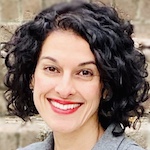 Sherrie Mazur will join the Arthur M. Blank Family Foundation as managing director, of communications on Feb. 14.
Sherrie Mazur will join the Arthur M. Blank Family Foundation as managing director, of communications on Feb. 14. 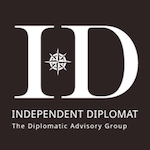 Independent Diplomat, the nonprofit that promotes democracy by organizing opposition movements and activists, has trained its sights on Venezuela.
Independent Diplomat, the nonprofit that promotes democracy by organizing opposition movements and activists, has trained its sights on Venezuela. Robert Tappan has joined the International BioMetrics + Identity Assoc., the trade group for the identity technology industry.
Robert Tappan has joined the International BioMetrics + Identity Assoc., the trade group for the identity technology industry.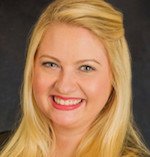 Tiffany Haverly, who was at Finsbury Glover Hering, has joined the Internet Association as director of communications.
Tiffany Haverly, who was at Finsbury Glover Hering, has joined the Internet Association as director of communications.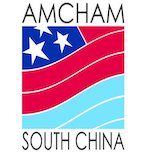 BGR Government Affairs represents the American Chamber of Commerce in South China as economic and political tensions between the two countries escalate.
BGR Government Affairs represents the American Chamber of Commerce in South China as economic and political tensions between the two countries escalate.


 Have a comment? Send it to
Have a comment? Send it to 
No comments have been submitted for this story yet.